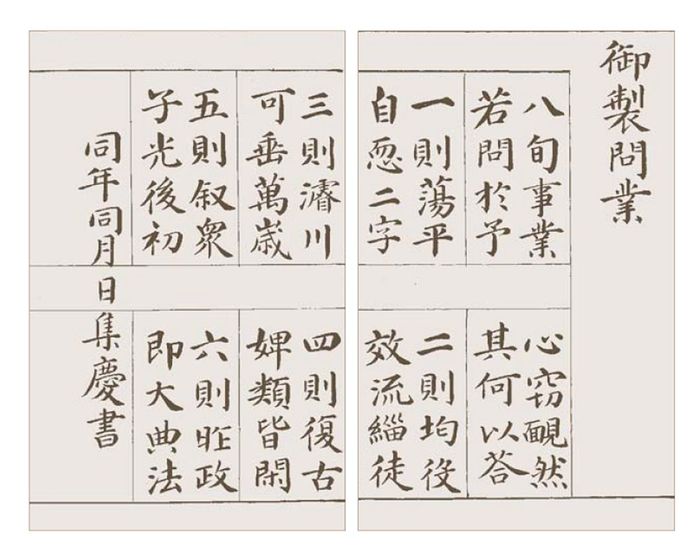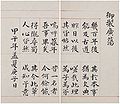"(Translation) 御製問業"의 두 판 사이의 차이
장서각위키
(→Original Script) |
|||
| (사용자 3명의 중간 판 14개는 보이지 않습니다) | |||
| 5번째 줄: | 5번째 줄: | ||
|Korean = 어제문업(''Eoje munup'') | |Korean = 어제문업(''Eoje munup'') | ||
|Genre = [[Royal Documents]] | |Genre = [[Royal Documents]] | ||
| − | |||
|Author = [https://en.wikipedia.org/wiki/Yeongjo_of_Joseon King Yeongjo] | |Author = [https://en.wikipedia.org/wiki/Yeongjo_of_Joseon King Yeongjo] | ||
|Year = 1774 | |Year = 1774 | ||
| 16번째 줄: | 15번째 줄: | ||
<gallery> | <gallery> | ||
| − | 파일:영조탕평비.JPG|link=(Translation) 蕩平碑|I- | + | 파일:영조탕평비.JPG|link=(Translation) 蕩平碑|I-2. 蕩平碑 탕평비(''Tangpyeongbi'') 1742 |
| − | 파일:영조균역준천사업.JPG|link=(Translation) 御製均役濬川卽予事業|I- | + | 파일:영조균역준천사업.JPG|link=(Translation) 御製均役濬川卽予事業|I-3. 御製均役濬川卽予事業 어제균역준천즉여사업(''Eoje gyunyeokjuncheonjeugyeosaeop'') 1773 |
| − | 파일:영조어제일초복고.JPG|link=(Translation) 御製壹初|I- | + | 파일:영조어제일초복고.JPG|link=(Translation) 御製壹初|I-4. 御製壹初 어제일초(''Eoje ilcho'') 1774 |
| − | 파일:영조어제수윤음.JPG|link=(Translation) 御製垂綸吟|I- | + | 파일:영조어제수윤음.JPG|link=(Translation) 御製垂綸吟|I-5. 御製垂綸吟 어제수윤음(''Eoje suyuneum'') 1774 |
| − | 파일:영조어제광탕서중.jpg|link=(Translation) 御製廣蕩|I- | + | 파일:영조어제광탕서중.jpg|link=(Translation) 御製廣蕩|I-6. 御製廣蕩 어제광탕(''Eoje gwangtang'') 1774 |
</gallery> | </gallery> | ||
| 28번째 줄: | 27번째 줄: | ||
=='''Original Script'''== | =='''Original Script'''== | ||
| − | {|class="wikitable" style="width:80%; background-color:#ffffff;" | + | {|class="wikitable" style="width:80%; font-size:110%; color:#002080; background-color:#ffffff;" |
| − | !style="width:40%;"| | + | !style="width:40%;"|Classical Chinese || style="width:60%;"| English |
|- | |- | ||
| | | | ||
| 56번째 줄: | 55번째 줄: | ||
|} | |} | ||
| − | ==''' | + | <!-- |
| + | =='''Discussion Questions'''== | ||
| + | # | ||
| + | # | ||
| − | |||
| − | |||
| − | |||
| + | =='''Further Readings'''== | ||
| + | <div style="color:#008080;"> | ||
| + | * View together with '''[http://kadhlab103.com/wiki/index.php/어제경민음 (Korean text) King Yeongjo’s Admonition for the People” (Eoje gyeongmineum 御製警民音, 1762)]''' | ||
| + | * View together with '''[[정조 윤음 번역|(Translation) King Jeongjo, “Royal dictum to encourage farming” (Gweonnong yuneum 勸農綸音, 1781)]]''' | ||
| + | </div> | ||
| + | =='''References'''== | ||
| + | <references/> | ||
| − | + | =='''Translation'''== | |
| − | |||
| − | |||
==='''Student 1 : Kim Young'''=== | ==='''Student 1 : Kim Young'''=== | ||
| 84번째 줄: | 88번째 줄: | ||
Written at Jipgyeong Hall. | Written at Jipgyeong Hall. | ||
| − | Discussion Questions: | + | *Discussion Questions: |
1. What does Yeongjo mean by taxing only men and now women? How was the policy actually implemented? What changes took place in society after the this new taxation law was enforced? | 1. What does Yeongjo mean by taxing only men and now women? How was the policy actually implemented? What changes took place in society after the this new taxation law was enforced? | ||
2. Why was Yeongjo so focused on increasing the rights of the sons of concubines? How did the sons of concubines generally live in the late Joseon dynasty? What careers did they usually take and what roles did they play in the family? | 2. Why was Yeongjo so focused on increasing the rights of the sons of concubines? How did the sons of concubines generally live in the late Joseon dynasty? What careers did they usually take and what roles did they play in the family? | ||
| 122번째 줄: | 126번째 줄: | ||
(1) The system of broad equality 蕩平策|탕평책 was a system of distribution of official positions between members of different factions, implemented by King Yeonjo to put an end to the factional strife. | (1) The system of broad equality 蕩平策|탕평책 was a system of distribution of official positions between members of different factions, implemented by King Yeonjo to put an end to the factional strife. | ||
| − | (2) Ryu Ja-gwan柳子光| | + | (2) Ryu Ja-gwan柳子光|류자광 (1439-1512) was famous military leader, literati and writer. His mother was concubine just like King Yeongjo’s mother. During the Joseon dynasty, the illegitimate sons were in an unequal position as compared to the sons of the first wife, and King Yeongjo aimed to change this social order. |
(3) The Great Code of Administration 經國大典|경국대전 (late 15th century) is the first legislation book of Joseon dynasty. | (3) The Great Code of Administration 經國大典|경국대전 (late 15th century) is the first legislation book of Joseon dynasty. | ||
| 138번째 줄: | 142번째 줄: | ||
Sixth, government of the previous era. This was Great Regulations and Laws. | Sixth, government of the previous era. This was Great Regulations and Laws. | ||
| − | Questions: | + | *Discussion Questions: |
- What do these documents tell us about King Yeongjo's personality? | - What do these documents tell us about King Yeongjo's personality? | ||
| 175번째 줄: | 179번째 줄: | ||
同年同月日集慶書 | 同年同月日集慶書 | ||
| − | Questions: | + | *Discussion Questions: |
Why did King Yǒngjo produce document justifying/promoting his own achievement? What might be a socio-political circumstance that led him to write these document? | Why did King Yǒngjo produce document justifying/promoting his own achievement? What might be a socio-political circumstance that led him to write these document? | ||
| 186번째 줄: | 190번째 줄: | ||
Written at the Chipkyong Hall. | Written at the Chipkyong Hall. | ||
| − | Question: In the mainstream narrative of Korean history, King Yongjo has been considered as the most Confucian ruler throughout the Choson dynasty. In this sense, it seems a bit extraordinary that he indeed endeavored to decrease the burden of taxation for female members of the population (albeit following the Chinese model). Then, would it be possible to reevaluate Yongjo as a relatively feminist monarch of the Choson dynasty in conjunction with the texts we dealt with today? | + | *Discussion Question: |
| + | In the mainstream narrative of Korean history, King Yongjo has been considered as the most Confucian ruler throughout the Choson dynasty. In this sense, it seems a bit extraordinary that he indeed endeavored to decrease the burden of taxation for female members of the population (albeit following the Chinese model). Then, would it be possible to reevaluate Yongjo as a relatively feminist monarch of the Choson dynasty in conjunction with the texts we dealt with today? | ||
==='''Student 6 : Hu Jing'''=== | ==='''Student 6 : Hu Jing'''=== | ||
| 198번째 줄: | 203번째 줄: | ||
Fourth, (I tried to) restore the ancient (governing) ways to lighten the burden of people like female slaves. | Fourth, (I tried to) restore the ancient (governing) ways to lighten the burden of people like female slaves. | ||
| − | Questions: | + | *Discussion Questions: |
1. Why did King Yeongjo implement new policies? What is the historical background? | 1. Why did King Yeongjo implement new policies? What is the historical background? | ||
| 208번째 줄: | 213번째 줄: | ||
Royal Writing of King Yongjo's Reflection on His Governance. | Royal Writing of King Yongjo's Reflection on His Governance. | ||
| − | After living for 80 years, if someone asks about my reflection upon my governance, I feel deeply | + | After living for 80 years, if someone asks about my reflection upon my governance, I feel deeply embarrassed. How can I respond that? |
| − | First, I implemented the policy of "Magnificant Harmony"*1 but it was neither magnificent nor harmonious. | + | First, I implemented the policy of "Magnificant Harmony"*1 but I am ashamed that it was neither magnificent nor harmonious. |
Second, I equalized taxation and corvee labor. It was so effective that it even benefitted Buddhist monks. | Second, I equalized taxation and corvee labor. It was so effective that it even benefitted Buddhist monks. | ||
Third, I dredged the river, so that it can serve people for many years. | Third, I dredged the river, so that it can serve people for many years. | ||
| 220번째 줄: | 225번째 줄: | ||
*note 1 translation from JaHyun Kim Haboush | *note 1 translation from JaHyun Kim Haboush | ||
| − | Question: | + | *Discussion Question: |
Why did King Yongjo want to reflect his own governance? And why did he obsess with restoring ancient policies? | Why did King Yongjo want to reflect his own governance? And why did he obsess with restoring ancient policies? | ||
| 291번째 줄: | 296번째 줄: | ||
*4 集慶堂, Chipkyŏng Tang | *4 集慶堂, Chipkyŏng Tang | ||
| − | Questions: | + | *Discussion Questions: |
1. Who is Yeongjo writing this text for? Who would ask/judge the Kings achievements? | 1. Who is Yeongjo writing this text for? Who would ask/judge the Kings achievements? | ||
| − | ==='''Student 11 : | + | ==='''Student 11 : Jinsook You'''=== |
---- | ---- | ||
Document 1 | Document 1 | ||
| 305번째 줄: | 310번째 줄: | ||
The fourth is setting up a new law according to the ancient policy, which relieved female slaves from their duties. | The fourth is setting up a new law according to the ancient policy, which relieved female slaves from their duties. | ||
The fifth is employing sons of a concubine to hold high government positions, for the first time since Yu Jakwang's case. | The fifth is employing sons of a concubine to hold high government positions, for the first time since Yu Jakwang's case. | ||
| − | And the sixth is | + | And the sixth is the state affairs of yesterday, which resulted in the Great Code of Administration |
| − | Question: | + | *Discussion Question: |
| − | Who was the most influential person for | + | Who was the most influential person for Yeongjo in his public life? |
==='''Student 12 : (Write your name)'''=== | ==='''Student 12 : (Write your name)'''=== | ||
| 320번째 줄: | 325번째 줄: | ||
The fourth is the restoration of antiquity. This law waived the burden of tax of female slaves. | The fourth is the restoration of antiquity. This law waived the burden of tax of female slaves. | ||
| + | *Discussion Question: | ||
How did King Yeongjo evaluate his merits and accomplishments? | How did King Yeongjo evaluate his merits and accomplishments? | ||
Why did he want to leave this royal writing about his own enterprises? | Why did he want to leave this royal writing about his own enterprises? | ||
| 350번째 줄: | 356번째 줄: | ||
---- | ---- | ||
| − | + | --> | |
| − | |||
| − | |||
| − | |||
| − | |||
2022년 2월 14일 (월) 23:48 기준 최신판
| Primary Source | ||
|---|---|---|
 |
Title | |
| English | In King Yeongjo’s own writing, when asked of my enterprises | |
| Chinese | 御製問業 | |
| Korean(RR) | 어제문업(Eoje munup) | |
| Text Details | ||
| Genre | Royal Documents | |
| Type | ||
| Author(s) | King Yeongjo | |
| Year | 1774 | |
| Source | ||
| Key Concepts | King Yeongjo, | |
| Translation Info | ||
| Translator(s) | Participants of 2017 Summer Hanmun Workshop (Advanced Translation Group) | |
| Editor(s) | ||
| Year | 2017 | |
Introduction
Original Script
| Classical Chinese | English |
|---|---|
|
御製問業 八旬事業 若問於予 心窃靦然 其何以答 一則蕩平 自恧二字 二則均役 效流緇徒 三則濬川 可垂萬歲 四則復古 婢類皆閑 五則叙衆 子光後初 六則昨政 卽大典法 同年同月日集慶書 |
(translation) |




